KIA Niro: Troubleshooting - Suspension System
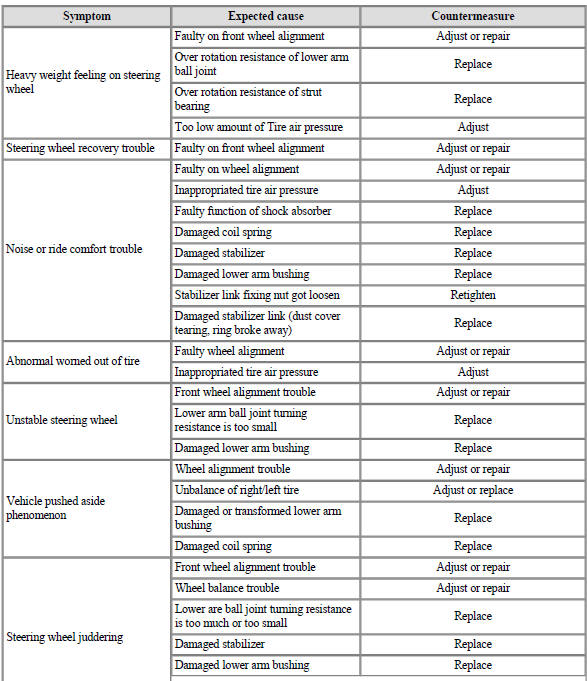

Symptom:
Heavy weight feeling on steering wheel
Expected cause - Countermeasure
- Faulty on front wheel alignment - Adjust or repair
- Over rotation resistance of lower arm ball joint - Replace
- Over rotation resistance of strut bearing- Replace
- Too low amount of Tire air pressure - Adjust
Symptom:
Steering wheel recovery trouble
Expected cause - Countermeasure
Faulty on front wheel alignment - Adjust or repair
Symptom:
Noise or ride comfort trouble
Expected cause - Countermeasure
- Faulty on wheel alignment - Adjust or repair
- Inappropriated tire air pressure - Adjust
- Faulty function of shock absorber - Replace
- Damaged coil spring - Replace
- Damaged stabilizer - Replace
- Damaged lower arm bushing - Replace
- Stabilizer link fixing nut got loosen - Retighten
- Damaged stabilizer link (dust cover tearing, ring broke away) - Replace
Symptom:
Abnormal worned out of tire
Expected cause - Countermeasure
- Faulty wheel alignment - Adjust or repair Inappropriated tire air pressure - Adjust
Symptom:
Unstable steering wheel
Expected cause - Countermeasure
- Front wheel alignment trouble - Adjust or repair
- Lower arm ball joint turning resistance is too small - Replace
- Damaged lower arm bushing - Replace
Symptom:
Vehicle pushed aside phenomenon
Expected cause - Countermeasure
- Wheel alignment trouble - Adjust or repair
- Unbalance of right/left tire - Adjust or replace
- Damaged or transformed lower arm bushing - Replace
- Damaged coil spring - Replace
Symptom:
Steering wheel juddering
Expected cause - Countermeasure
- Front wheel alignment trouble - Adjust or repair
- Wheel balance trouble - Adjust or repair
- Lower are ball joint turning resistance is too much or too small - Replace
- Damaged stabilizer - Replace
- Damaged lower arm bushing - Replace
- Shock absorber operating trouble - Replace
- Coil spring trouble - Replace
Strange sound type from under body by parts
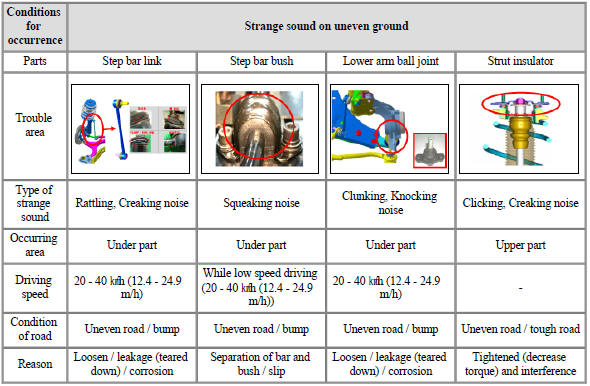
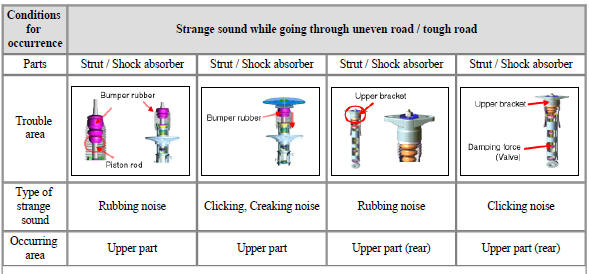


Wheel and tire diagnosis
Wheel /tire noise, vibration and harshness concerns are directly related to vehicle speed and are not generally affected by acceleration, coasting or decelerating. Also, out-of-balance wheel and tires can vibrate at more than one speed. A vibration that is affected by the engine rpm, or is eliminated by placing the transmission in Neutral is not related to the tire and wheel.
As a general rule, tire and wheel vibrations felt in the steering wheel are related to the front tire and wheel assemblies.
Vibrations felt in the seat or floor are related to the rear tire and wheel assemblies. This can initially isolate a concern to the front or rear.
Careful attention must be paid to the tire and wheels. There are several symptoms that can be caused by damaged or worn tire and wheels. Perform a careful visual inspection of the tires and wheel assemblies. Spin the tires slowly and watch for signs of lateral or radial runout. Refer to the tire wear chart to determine the tire wear conditions and actions
Wheel and tire diagnosis
Rapid wear at the center
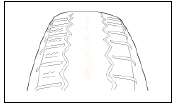
- Center-tread down to fabric due to excessive over inflated tires
- Lack of rotation
- Excessive toe on drive wheels
- Heavy acceleration on drive
Rapid wear at both shoulders
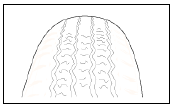
- Under-inflated tires
- Worn suspension components
- Excessive cornering speeds
- Lack of rotation
Wear at one shoulder
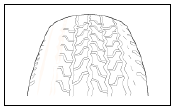
- Toe adjustment out of specification
- Camber out of specification
- Damaged strut
- Damaged lower arm
Partial wear
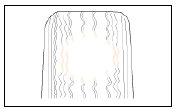
- Caused by irregular burrs on brake drums
Feathered edge
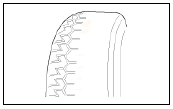
- Toe adjustment out of specification
- Damaged or worn tie rods
- Damaged knuckle
Wear pattern
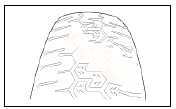
- Excessive toe on non-drive wheels
- Lack of rotation
READ NEXT:
 Front Suspension System
Front Suspension System
Front axle
Stabilizer bar
Gear box
Drive shaft
Subframe
Stabilizer link
Front lower arm
Front Strut Assembly Components and components location
Strut assembly
Insulator
Bearing
Spring upper pad
Spring
Dust cove
 Front Strut Assembly Repair procedures
Front Strut Assembly Repair procedures
Removal
Remove the wheel and tire.
Tightening torque:
107.9 - 127.5 N*m (11.0 - 13.0 kgf*m, 79.6 - 94.0 lb*ft)
Warning
Be careful not to damage the wheel nuts when removing the wheel and
tire.
Remove the stabilizer link nut.
Ti
 Front Lower Arm Repair procedures
Front Lower Arm Repair procedures
Front Lower Arm Components and components location
Components
Ball joint assembly
Front lower arm assembly
Front Lower Arm Repair procedures
Removal
Remove the wheel and tire.
Tightening torque:
107.9 - 127.5 N*m (11.0 - 13.0 k
SEE MORE:
 Trickle charger (portable charging
cable)
Trickle charger (portable charging
cable)
Trickle charger can be used if AC Charger
is unavailable.
Plug and cable
Control box (ICCB)
Charging connector/cable
How to connect portable charger (ICCB: In-Cable
Control Box)
Connect the plug to a household electric
outlet.
 Checking the tire
pressure
Checking the tire
pressure
Tire Pressure Monitoring System (TPMS) (if equipped)
Low tire pressure telltale /TPMS malfunction
indicator
Low tire pressure position telltale
(Shown on the LCD display)
Check tire pressure
You can check the tire pressure in the
Categories
- Home
- KIA Niro EV, Hybrid - Second generation - (SG2) (2021-2024) - Owner's manual
- Kia Niro - First generation - (DE) (2017-2022) - Service and Repair Manual
- Contact Us
